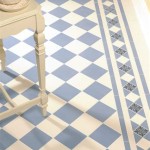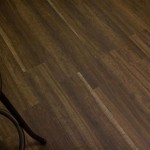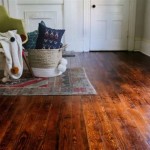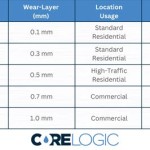How Thick Is Vinyl Plank Flooring?
The thickness of vinyl plank flooring is an essential factor to consider when choosing the right flooring for your home. It influences various aspects, including durability, stability, and comfort underfoot. Vinyl plank flooring typically ranges in thickness from 2mm to 8mm, with each thickness offering its unique advantages and suitability for different areas of your home.
2mm - 3mm Vinyl Plank Flooring
The thinnest vinyl plank flooring is 2mm to 3mm. It is ideal for areas with limited space, such as under appliances or in transition areas between different flooring types. Due to its thinness, it is flexible and can be easily cut to fit around obstacles. However, it may not be as durable as thicker planks and is best suited for low-traffic areas.
4mm - 5mm Vinyl Plank Flooring
4mm to 5mm vinyl plank flooring is a versatile option that offers a balance between durability and comfort. It is suitable for most residential areas, including bedrooms, living rooms, and hallways. The thicker planks provide more stability, making them less prone to buckling or warping. Additionally, they offer a slight cushioning effect, enhancing comfort underfoot.
6mm - 8mm Vinyl Plank Flooring
6mm to 8mm vinyl plank flooring is the thickest and most durable option. It is ideal for high-traffic areas, such as kitchens, entryways, and commercial spaces. The increased thickness provides excellent stability, resistance to wear and tear, and sound insulation. Additionally, thicker planks can better withstand heavy furniture and appliances without showing indentations.
Choosing the Right Thickness
The appropriate thickness of vinyl plank flooring for your home depends on several factors:
- Traffic Level: High-traffic areas require thicker planks for durability.
- Subfloor Condition: Thicker planks can help conceal imperfections in the subfloor.
- Furniture Weight: Areas with heavy furniture may need thicker planks to prevent indentations.
- Comfort: Thicker planks provide more cushioning for improved comfort underfoot.
- Sound Insulation: Thicker planks offer better sound insulation, reducing noise transmission.
It is recommended to consult with a flooring professional to determine the ideal thickness for your specific needs. They can assess your home's requirements and suggest the most suitable option.
Benefits of Thicker Vinyl Plank Flooring
While thicker vinyl plank flooring may cost slightly more than thinner options, it offers several advantages:
- Increased Durability: Thicker planks are more resistant to scratches, dents, and wear.
- Enhanced Stability: They are less likely to buckle or warp, even in high-moisture environments.
- Improved Sound Insulation: Thicker planks reduce noise transmission, creating a quieter living space.
- Greater Comfort: They provide more cushioning, reducing fatigue and improving underfoot comfort.
- Conceals Subfloor Imperfections: Thicker planks can help hide unevenness or imperfections in the subfloor.
Maintenance and Care
Regardless of the thickness, vinyl plank flooring is generally easy to clean and maintain. Regular sweeping, vacuuming, or mopping with a damp mop is sufficient. Avoid using harsh chemicals or abrasive cleaners, as they can damage the finish. For spills or stains, blot them up immediately with a clean cloth and avoid scrubbing.

How Thick Is Vinyl Plank Flooring Thickness Guide Reallycheapfloors America S Cheapest Hardwood

Choose The Suitable Spc Flooring Vinyl Floor Lvt For You

How Thick Is Vinyl Plank Flooring Thickness Guide Reallycheapfloors America S Cheapest Hardwood

3 Ways To Choose Vinyl Plank Flooring Wikihow

3 Ways To Choose Vinyl Plank Flooring Wikihow

Vinyl Flooring Thickness Guide What Mm Do I Choose

How To Choose Perfect Thickness Of Vinyl Plank Flooring

How Long Does Luxury Vinyl Tile Flooring Last Taj

Vinyl Plank Flooring Thickness Guide How To Choose

Luxury Vinyl Flooring Thickness And Wear Layer Comparison








